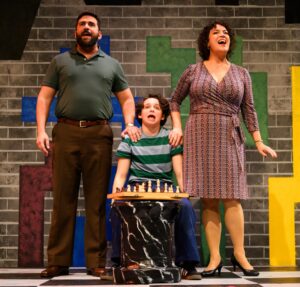Falsettos
William Finn (Music & Lyrics); William Finn & James Lapine (Book)
42nd Street Moon

As state legislatures by the dozens pass anti-LGBTQ laws by the score, 42nd Street Moon’s opening of William Finn and James Lapine’s Falsettos could hardly be timelier. A compelling, well-voiced cast of seven under the sensitive, spot-on direction by Dennis Lickteig powerfully, passionately conveys the musical’s core messages of life and love, commitment and compassion among family and friends and among new lovers and ex-lovers – whether gay or straight, living or dying. Their intertwined, rollercoaster lives of being happy, angry, and sad vividly illustrates the complicated ups and downs of growing up, of being in relationship, and of finally feeling comfortable figuring out what it means to be human.
Falsettos is an all-musical journey through three years of the lives of Marvin, his ex-wife Trina, his ten-year-old son Jason, his much-younger lover Whizzer, and his psychiatrist Mendel. Neighbors and friends, Dr. Charlotte and her life partner Cordelia, eventually round out the configuration, resulting in many oft-changing patterns of sometimes intersecting and sometimes non-intersecting relationships. William Finn began exploring Marvin and his core family in the 1979 one-act musical In Trousers. Two years later, James Lapine joined him as they penned March of the Falsettos, followed in 1990 with the third edition – in the bleak peak of the AIDS crisis – with Falsettoland. In 1992, the latter two one-acts were joined into the present, 42nd Street Moon version of the musical, Falsettos.
A story that has much pain, conflict, regret, and inevitable sorrow threaded throughout also has loads of humor, lots of genuine caring, and uplifting expressions of love that cannot help but touch hearts of those watching. In other words, the story is about life itself as most of us experience it in any of our own three-year segments.

The other thread in this slice of these lives is being Jewish, a source of much of the humor and a key element of the plot in Act Two’s reenactment of Falsettoland. In fact, the musical begins with an introduction of the kind of bickering we will see cropping up time and again throughout the two-plus hours of the evening as the four males (with Trina chiming in from the sidelines) hilariously sing “Four Jews in a Room Bitching.” As they relate a part of the original story of Exodus, a red sea appears and then splits, in many ways symbolizing the relationships among them that will flow and divide time and again in the course of their stories.
As Marvin, William Giammona steps forward to sing with clear conviction his story in “A Tight Knit Family” – a story about a man who is leaving his wife for a gay lover but who still wants that ex-wife to be above all loyal to him. With firm-jawed determination, he ends with a repeated, “I want it all.”

As the central character, Marvin is a man that the more we get to know him, the harder he is to like very much – at least in the first act’s repeated glimpses. He is often like a spoiled child, wanting to be the center of everyone’s love and attention while himself finding it difficult to reciprocate without making accusations, pouting off by himself in a corner, or erupting into a full-on shouting match with almost any one of the others around him. William Giammona captures well the approach/avoidance nature of Marvin’s struggles with everyone from his ex to his lover to even his son. With ever-increasingly strong and emotion-revealing vocals, Marvin rises time and again effectively to sell numbers that serve as milestones in his journey to come to grips with his decision to leave his wife Trina, with his struggles to be a good father to Jason, and with his difficulty to love fully and unconditionally Whizzer.

The relationship between Marvin and Whizzer, as described in a combative duet entitled “Thrill of First Love,” is one of hot passion in bed and passionate arguing and fighting most of the time when not in bed. Theirs is much like a dad/teenage-son pattern of ongoing bickering, with Marvin the provider and the demander and Whizzer the one who never can meet the high standards that his lover has for him.
Quickly, Samuel Prince establishes his easy-going, less volatile Whizzer as amiable and a guy who knows himself pretty well, accepting his own faults more easily than Marvin does his own. In “The Games I Play,” Whizzer bears his soul to us in a song where he admits with air-piercing, powerfully conveying notes, “It hurts not to love him, it hurts when love fades; it’s hard when part of him is off playing family charades.” We want to root for Whizzer even when we are not sure at times if we do for Marvin. As the second act progresses, however, Whizzer becomes the person all are there to support, with his gut-wrenching “You Gotta Die Sometime” leaving a lasting, haunting impression that we cannot help but remember as he repeatedly, heart-wrenchingly reflects, “Sometime, sometime, sometime.”

Whizzer’s biggest fan is Jason, a boy who has difficulty relating to the father who left his mother but who finds in his father’s lover someone he can talk to and feel heard. Madelyn Simon (alternating the role of Jason with Yuval Weissberg) projects a giant, easily likeable personality as the small kid who goes from ten to thirteen in the course of the evening. Not unlike the typical pre-teen, Jason shrugs off with little-to-no reactions his parent’s worries and questions; yet it often seems as if this kid is the only adult in the room — especially in the heat of the planning of a bar mitzvah that in many ways seems mostly for the two parents. Madelyn Simon sings with both the gusto of youth and the serious insight of someone seemingly older than the number of years actually lived. Jason is just a good kid trying his best to navigate through the melodrama of parents’ lives and the mysterious, sudden sickness of his pal, Whizzer.

Unlike her son, Trina does not find Whizzer a person she wants to like, much less love – at least not until she begins to see him more through the eyes of her son. Trina is in the beginning totally pissed about the cards she has been dealt by Marvin and seeks help from Marvin’s psychiatrist, Mendel. Mendel uses his sessions with her to begin wooing her and uses his sessions with Marvin to question about his ex-wife’s love of wearing negligee and of her frequency of sleeping naked.
Gary Brintz excels in his depiction of Mendel, bringing to his Mendel a mixture of something bordering on sleaze, a bundle of boyish mannerisms, and yet at times all-out charm that actually make him totally interesting and fun to watch as he progresses from outsider to full member of the family – the latter once he and Trina become much more than doctor/client. The intensity brought to the part at times make the veins in his neck appear ready to pop while his voice projects that same intensity of character in notes that ring with deeply expressive affect. His exuberance even sells Jason that his new stepdad is a fun guy to have around (as seen in their wild and winning duet, “Everyone Hates His Parents”).

Even after finding a new husband, Trina – like Marvin – has trouble letting go of their past and her lingering mixture of feelings alternating between love and hate. As Trina, Ariela Morgenstern commands the stage time and again with a powerhouse of a voice that demands we pay attention and take notice. Her Trina is a complicated conglomeration of feelings and reactions as a woman wracked with questions why did she once love and marry a man who turned out to be gay and a cheat, why she now feels inadequate to help her own son deal with feelings about his parents breaking up, and why she is suddenly in love with a man who should not have come on to her as her psychiatrist. When she takes the stage spotlight for “Trina’s Song,” her Trina goes into an eye-popping, half-crazed state as she madly chops bananas and carrots (clearly supposing them to be a man’s you-know-what), singing in a voice reminiscent of the 1930/40’s big screen, “I’m breaking down.” Later in her “Holding to the Ground” as she sings a major theme of the musical – “Live is never what you planned, life is moments you can’t understand” – we cannot help but be in hushed awe of the tremendous range of emotions she brings in both voice and facial expressions as she lays bare Trina’s admissions and confessions, fears and doubts, hopes and dreams.

Rounding out the cast in the second act are the new neighbors and lesbian couple, Cindy Goldfield as Charlotte – soon to be Whizzer’s doctor – and Monica Rose Slater as Cordelia, an aspiring but not-yet-successful caterer. In one of the more sobering moments of the evening, Dr. Charlotte sings of a spreading disease “so bad that words have lost their meaning,” where “rumors fly and takes abound, stories echo underground.”
By continually directing them to the stage’s edge, Dennis Lickteig ensures that all persons have a chance to make their case directly to us as audience as they spill with seemingly little editing their innermost, probably yet-said-aloud thoughts and feelings. Their intertwined lives where one moment’s laughter and joy become the next moment’s anger, resentment, loneliness, or even terror is highlighted by the decision often to have characters remain on stage in scenes not including them, with their not only watching intently but often having their own reactions and even momentary interaction with the other scene.
The rollercoaster that these family, friends, and lovers are riding in their lives has plenty of fun, silly, and exhilarating moments to counter the scarier, maddening dips. William Finn’s ever-clever lyrics, the director’s tongue-in-cheek moves, and the snappy variations from march to line-dance of Leslie Waggoner’s choreography provide much-needed comic relief in scenes like a little league game with a stand full of loudly coaxing adults and a kid at home plate whose bat has no idea how to find the ball or like in a parade line-up of the play’s males all singing in voices deliciously squawking and squeaking to the heavens in “March of the Falsettos.”
Particularly impressive in this 42nd Street Moon’s production is the four-person band under the direction of the Moon’s perennially favorite, Dave Dobrusky. The woodwind playing of Terry Halvorson especially deserves kudos as the second member of a duet with Trina in the deeply revealing and moving “Trina’s Song.”
For anyone who is worried that a musical whose roots are thirty-five-plus years old is now out-of-date, a visit to 42nd Street Moon’s Gateway Theatre will soon destroy that fear. William Finn and James Lapine’s Falsettos is perhaps more relevant and meaningful than ever in a world where once again threatening questions are being raised in this country and all across the globe of what defines a real “family” and who legitimately and legally gets to love whom. What Falsettos literally sings clearly is that love is love is love if we just give ourselves time and permission to figure it all out.
Rating: 5 E
A Theatre Eddys Best Bet Production
Falsettos continues through March 17, 2024 in production by 42nd Street Moon at the Gateway Theatre, 215 Jackson Street, San Francisco. Tickets are available online at http://42ndstmoon.org or by calling the box office at 415-255-8207.
Photo Credits: Ken Krantz Studio
